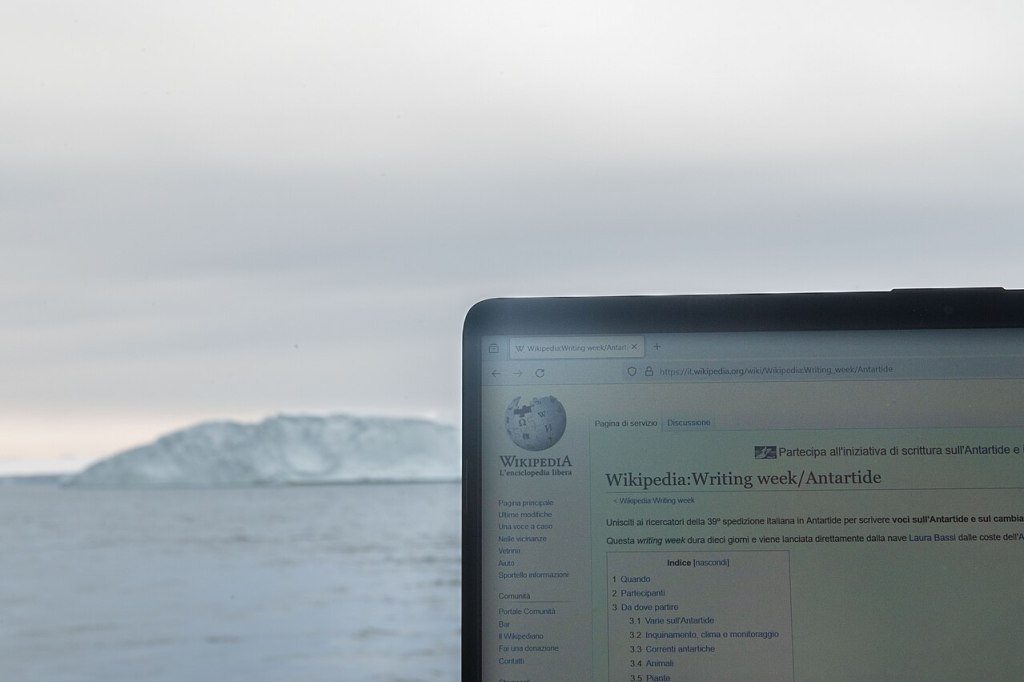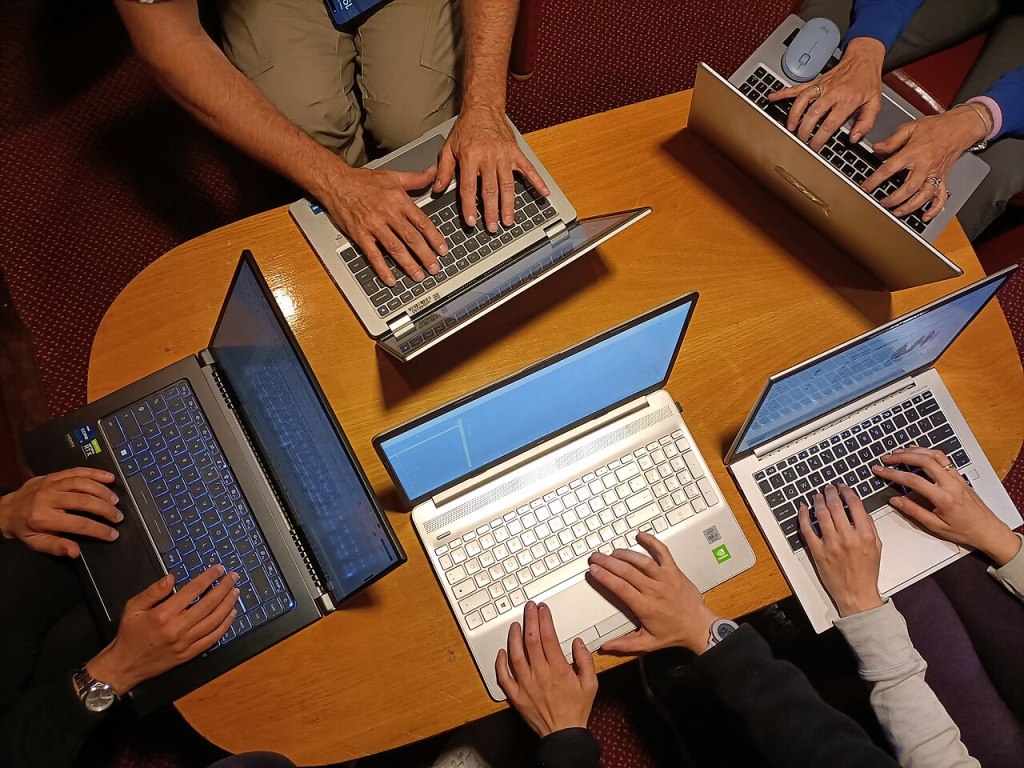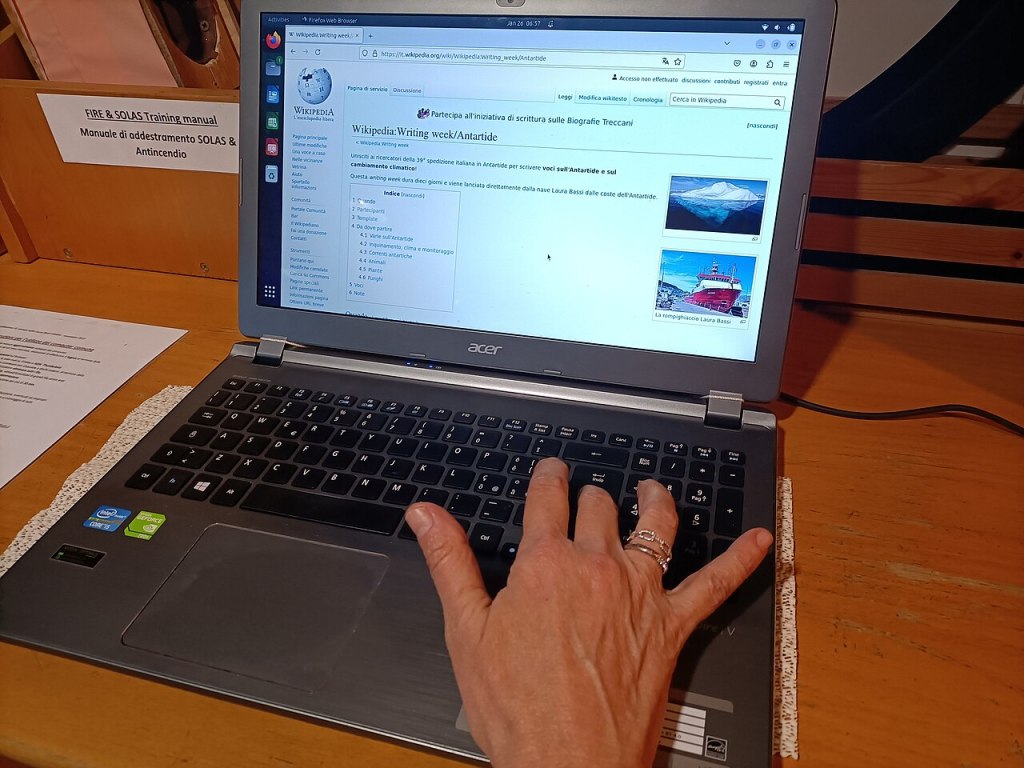
Between January 1st and March 5th, 2024, I was involved in a mission with the Italian National Antarctic Research Program (PNRA) aboard the icebreaker RV Laura Bassi, moving through the Ross Sea, the largest protected area in the world. Dealing with environment and climate change in my research as an analytical chemist at the University of Genoa, it wasn’t the first time I found myself in Antarctica, but this time the mission had a particular significance, linked to another great passion of mine: Wikipedia.
In my four previous missions, I had already talked about my volunteer work on Wikipedia to colleagues I met on the ship or at the base, often discovering other Wikipedians or people very interested in the project. At the same time, like many other readers or volunteers, I was aware that both on Italian Wikipedia and in other languages, articles dedicated to Antarctica and more generally to climate change often proved to be absent or superficial. Before leaving, I had begun to consider the idea of organizing an editathon, a Wikipedia writing marathon, dedicated precisely to these topics. Fortunately, once on board, my proposal was well received by the party chief and other colleagues. And that’s how we organized the first editathon from Antarctica.
Technical limitations
As one can imagine, life at an Antarctic station is not easy, especially when that is a ship moving through ice, with strong winds and sometimes considerable waves. All the people participating in the mission have experiments to conduct related to their research project, but they may also be called upon to help colleagues or to perform measurements, sampling, or other experiments for scientists not present at the base. The work schedule is organized in variable shifts throughout the 24 hours, so that all laboratories can be used with maximum efficiency.

However, the biggest obstacle for a Wikipedian was another one: at the end of January 2024, when we chose to launch the editathon, Internet access was limited. Except for the devices used by navigation and logistics services, only three computers had access to a connection. And this absolutely complicates things when you want to write on Wikipedia. We solved this problem quite simply: by working off-line, coordinating with Wikimedia Italy to publish and edit articles at the beginning of the marathon. So, together with colleagues Paola Rivaro, Angela Garzia, Craig Stevens, Jasmin McInerney, and Liv Cornelissen, we wrote the first articles related to the editathon, which served as a starting point for volunteers who wanted to participate from Italy as well.
The results
Rather than an editathon, we should talk about an extended contribution period. Initially, in fact, we proposed to the Italian Wikipedia community to participate in a week of contribution on Antarctica and climate change. The proposal was very well received, well beyond expectations: the week, starting on February 1st, 2024, actually became a month and then a whole new project on Italian Wikipedia, all dedicated to Antarctica, with its Antarctic Base for discussions. I would have never expected such enthusiasm, both among my shipmates and among Wikipedia volunteers.
Thanks to the commitment of these people, today there are more than 150 new or improved articles on Italian Wikipedia: some of them are of fundamental importance in describing the continent (such as Antarctic Ice Sheet or Antarctic Ice Shelf) and the effects of climate change (for example Polar Amplification or Ice-Albedo Feedback). However, I would like to highlight articles that were not translated from English Wikipedia, but were created from scratch based on scientific sources during the editathon on the ship, such as Terra Nova Bay Polynya, High Salinity Shelf Water, and Marine Particulate Matter, but also Rain-on-snow event, written by a user in Italy. These articles represent a pride and added value for the entire community, being absent in all projects before their creation on the Italian version.

The participation of foreign colleagues, who contributed to English Wikipedia, was an unexpected and very welcome surprise (even with theme photos, taken and uploaded by Liv Cornelissen and Luisa Fontanot). I think that on board, all researchers understood the importance of scientific dissemination even through non-institutional means like Wikipedia, which allow the spread of free knowledge and important discoveries to as wide an audience as possible. If we, the “experts on the topic”, make the information that readers can find online reliable, the collective benefit is evident. Finally, I would also like to thank the implementing bodies of the PNRA and Wikimedia Italy for their interest and commitment to the logistical and communication aspects, fundamental for the success of the initiative.
Francisco Ardini
Associate Professor of Analytical Chemistry at the University of Genoa. He studies contamination in polar environments, participating in projects and expeditions in the Arctic and Antarctica, and carrying out outreach activities on the subject for schools and cultural associations. Since 2020, he has been proposing activities on Wikimedia projects (Wikibooks, Wikipedia, Wikivoyage, Wikimedia Commons) for schools, universities, and museums in the field of chemistry and climate change.
The Italian mission in Antarctica
The original writing week involved researchers engaged in the 39th Italian expedition to Antarctica, as part of the National Antarctic Research Program (PNRA). The PNRA is funded by the Italian Ministry of University and Research and is managed by CNR for scientific coordination, by ENEA for planning and logistical organization of activities at the bases on the continent, and by the National Institute of Oceanography and Experimental Geophysics – OGS for the technical and scientific management of the icebreaker ship Laura Bassi. Researchers from various nationalities belonging to Antarctica New Zealand also participated in the mission, contributing to English Wikipedia.

Can you help us translate this article?
In order for this article to reach as many people as possible we would like your help. Can you translate this article to get the message out?
Start translation